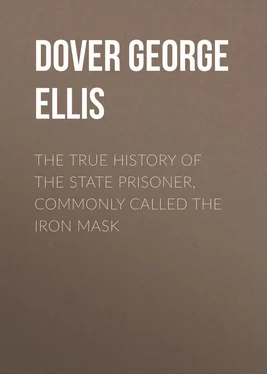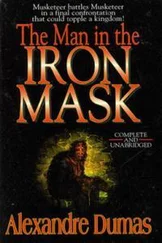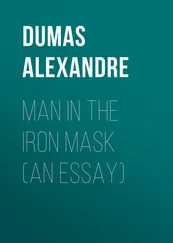George Dover - The True History of the State Prisoner, commonly called the Iron Mask
Здесь есть возможность читать онлайн «George Dover - The True History of the State Prisoner, commonly called the Iron Mask» — ознакомительный отрывок электронной книги совершенно бесплатно, а после прочтения отрывка купить полную версию. В некоторых случаях можно слушать аудио, скачать через торрент в формате fb2 и присутствует краткое содержание. Жанр: foreign_antique, foreign_prose, на английском языке. Описание произведения, (предисловие) а так же отзывы посетителей доступны на портале библиотеки ЛибКат.
- Название:The True History of the State Prisoner, commonly called the Iron Mask
- Автор:
- Жанр:
- Год:неизвестен
- ISBN:нет данных
- Рейтинг книги:5 / 5. Голосов: 1
-
Избранное:Добавить в избранное
- Отзывы:
-
Ваша оценка:
- 100
- 1
- 2
- 3
- 4
- 5
The True History of the State Prisoner, commonly called the Iron Mask: краткое содержание, описание и аннотация
Предлагаем к чтению аннотацию, описание, краткое содержание или предисловие (зависит от того, что написал сам автор книги «The True History of the State Prisoner, commonly called the Iron Mask»). Если вы не нашли необходимую информацию о книге — напишите в комментариях, мы постараемся отыскать её.
The True History of the State Prisoner, commonly called the Iron Mask — читать онлайн ознакомительный отрывок
Ниже представлен текст книги, разбитый по страницам. Система сохранения места последней прочитанной страницы, позволяет с удобством читать онлайн бесплатно книгу «The True History of the State Prisoner, commonly called the Iron Mask», без необходимости каждый раз заново искать на чём Вы остановились. Поставьте закладку, и сможете в любой момент перейти на страницу, на которой закончили чтение.
Интервал:
Закладка:
To Estrades, Lewis returned a long and detailed statement of his views; in which he approves generally of the design of putting a French garrison into Casale; intimates upon what terms it may be done; rejects a request of the Duke of Mantua to procure for him the restoration of those parts of the Montferrat, which by former treaties had been ceded to the Duke of Savoy; objects to the largeness of his demand of 100,000 pistoles as the price of Casale; promises to bear him harmless and remunerate him for any injury that may be done to him by the Spaniards, in consequence of his siding with the French; and finally instructs Estrades, to entertain the notion that a French army is about to pass the Alps, and in the meanwhile to protract the negociation, in order to allow him, Lewis, time to make his various preparations. Indeed this last point, the necessity for delay, was so strongly impressed upon Estrades, upon more than one occasion, that, in a subsequent despatch, he expresses his regret that the negociation goes on so smoothly and prosperously, that he cannot find any difficulties 30to enable him to protract it till the troops of Lewis are in readiness to march towards Italy.
The only point in dispute appears to have been, what the sum of money should be which was to be given by the French Monarch to the Duke of Mantua. The stipulation for 100,000 pistoles was decidedly rejected by Lewis; and at length, after some difficulty, Estrades reduced the demand of the other party to 100,000 crowns, and those not to be paid till after the signature of the treaty between the two sovereigns. 31
The next event of importance in the negociation was the interview, effected at Venice during the Carnival, between the Duke of Mantua and Estrades. It took place at midnight, on the 18th of March, 1678, in a small open space, equally distant from the residence of the Duke and the Ambassador, and lasted a full hour. In it the Duke dwelt 32much upon his impatience for the conclusion of the treaty with France; and for the speedy appearance of the troops of the latter in Italy, alleging as his reason, the constant and lively fear he was in of the Spaniards. He also announced his intention of sending Matthioli, in whom, says Estrades, “He has a blind confidence, and who governs him absolutely,” to the French court; thinking that his presence there might bring matters to a speedier issue.
Estrades, who had now ascertained that his master could not possibly spare an army for Italy that year (1678), and who therefore was more than ever anxious to prevent such a consummation, consented with considerable difficulty to the project; resolving, at the same time, to obstruct the departure of Matthioli for France as long as possible; and writing to M. de Pomponne to delay him and his business, when at length he arrived there, by every means in his power. 33
Subsequently the procrastinating intentions of Estrades were more easily put into execution than he expected; for Matthioli, of his own accord, deferred his journey from spring to autumn on various pleas, of which the principal one was, his unwillingness to leave his master, exposed to the insinuations, and perhaps menaces, of the Spanish partizans, by whom he was surrounded. 34
Finally, after many delays, Matthioli, accompanied by Giuliani, set off for Paris in the beginning of November, 1678, and arrived there towards the end of the same month. 35He found the Abbé d’Estrades, who had quitted his Venetian Embassy, arrived there before him, and had several interviews with him and M. de Pomponne; during which a treaty was agreed on to the following effect: —
1. That the Duke of Mantua should receive the French troops into Casale.
2. That if Lewis sent an army into Italy, the Duke of Mantua should have the command of it.
3. That immediately after the execution of the treaty, the sum of 100,000 crowns should be paid to the Duke of Mantua. 36
The treaty contained also some other articles of minor importance.
Matthioli himself had the honour of being received in a secret audience by Lewis, 37who made him a present of a valuable ring. 37He also received a sum of money for himself, 37and a promise of a much larger gratification 38after the ratification of the treaty. He was also promised that his son should be made one of the King’s Pages; and that his brother, who was in the Church, should receive a good benefice. 39He was then sent back to Italy, with a detailed instruction from Louvois, 40upon the manner of executing the articles of the treaty.
The French Government was thus far so entirely satisfied of the sincerity and good faith of Matthioli, and so convinced of the speedy admission of the French troops into Casale, that they immediately upon his departure took decided measures in furtherance of their plan. 41Thus the Marquis de Boufflers, 42Colonel-General of the Dragoons, was sent to take the command of the forces, which were assembling near the frontier of Italy, at Briançon, in Dauphiny. Catinat, 43Brigadier of Infantry, afterwards the celebrated Marshal of that name, who was to serve under the command of Boufflers, had orders to conceal himself in the fortress of Pignerol, 44and to adopt a feigned name, that of Richemont; 45while the Baron d’Asfeld, 46Colonel of Dragoons, was despatched to Venice, upon a mission for exchanging the ratifications of the treaty; for which purpose he was to unite with M. de Pinchesne, the Chargé d’Affaires there, during the absence of an ambassador. 47
Though these measures were taken with the greatest secrecy, it was impossible but that the report of the assembling of the French forces so near the territories of the Duke of Savoy, 48should reach the ears of the Spaniards, and excite their suspicions; as well as those of the Venetians, and of the other Italian states. Accordingly, we find that remonstrances were several times made by the ambassadors of the Emperor 49and King of Spain 50at Venice, to the Duke of Mantua, upon the rumour of his intention of delivering the capital of the Montferrat to Lewis. Ferdinand Charles denied that this was the case; 51but was not believed.
As, therefore, the ferment and discontent in the north of Italy increased, the agents of the French Government were naturally anxious that the treaty should be ratified and executed as soon as possible; for which purpose, the Duke of Mantua had promised to meet the Baron d’Asfeld at Casale, during the month of February, 1679. In proportion, however, as the French became more impatient for the conclusion of the affair, the Count Matthioli found fresh excuses for delaying it. At one moment his own ill health detained him at Padua, and prevented his coming to Venice to confer with Messrs. de Pinchesne and d’Asfeld; at another, the Duke of Mantua could not raise a sufficient sum of money to enable him to transport his court to Casale; at another, it was necessary to have time to persuade Don Vincent Gonzaga 52to accompany the Duke to Casale, as it was not considered safe to leave him at Mantua; and again, the Duke of Mantua was obliged to stay at Venice, having promised to hold a carrousel there. 53
In spite of all these difficulties, it was, however, finally arranged, that the Baron d’Asfeld and Matthioli should meet, on the 9th of March, at Incréa, a village ten miles from Casale, in order to make the exchange of the ratifications; that the Duke of Mantua himself, should go to Casale on the 15th of the same month; and should put the troops of Lewis into possession of the place on the 18th; on which day, being the ninth after the ratification, it was decided they could without fail be there. 54
The various excuses made by Matthioli, for the non-execution of his agreement, all more or less frivolous, appear first to have given to the French Government a suspicion of his fidelity. Whether the reception of Matthioli at the French court had not been such as he expected, though it would appear to have been most gracious; or whether, which is more probable, the sum of money there given to him did not content him; – or whether, which is also probable, the Spaniards having got some knowledge of the transaction, had offered him a still larger bribe, it is impossible for us, at this distance of time, exactly to decide; but it appears evident, that, from the time of his return from Paris, his conduct with regard to the negociation became entirely changed; and he was as anxious to procrastinate, as he had formerly been to advance it. It was, therefore, natural for the French diplomatists to conclude, supported as this opinion also was by various circumstantial evidence, that he had been bought by the other side – a circumstance of no extraordinary occurrence in the career of a needy Italian adventurer.
Читать дальшеИнтервал:
Закладка:
Похожие книги на «The True History of the State Prisoner, commonly called the Iron Mask»
Представляем Вашему вниманию похожие книги на «The True History of the State Prisoner, commonly called the Iron Mask» списком для выбора. Мы отобрали схожую по названию и смыслу литературу в надежде предоставить читателям больше вариантов отыскать новые, интересные, ещё непрочитанные произведения.
Обсуждение, отзывы о книге «The True History of the State Prisoner, commonly called the Iron Mask» и просто собственные мнения читателей. Оставьте ваши комментарии, напишите, что Вы думаете о произведении, его смысле или главных героях. Укажите что конкретно понравилось, а что нет, и почему Вы так считаете.












